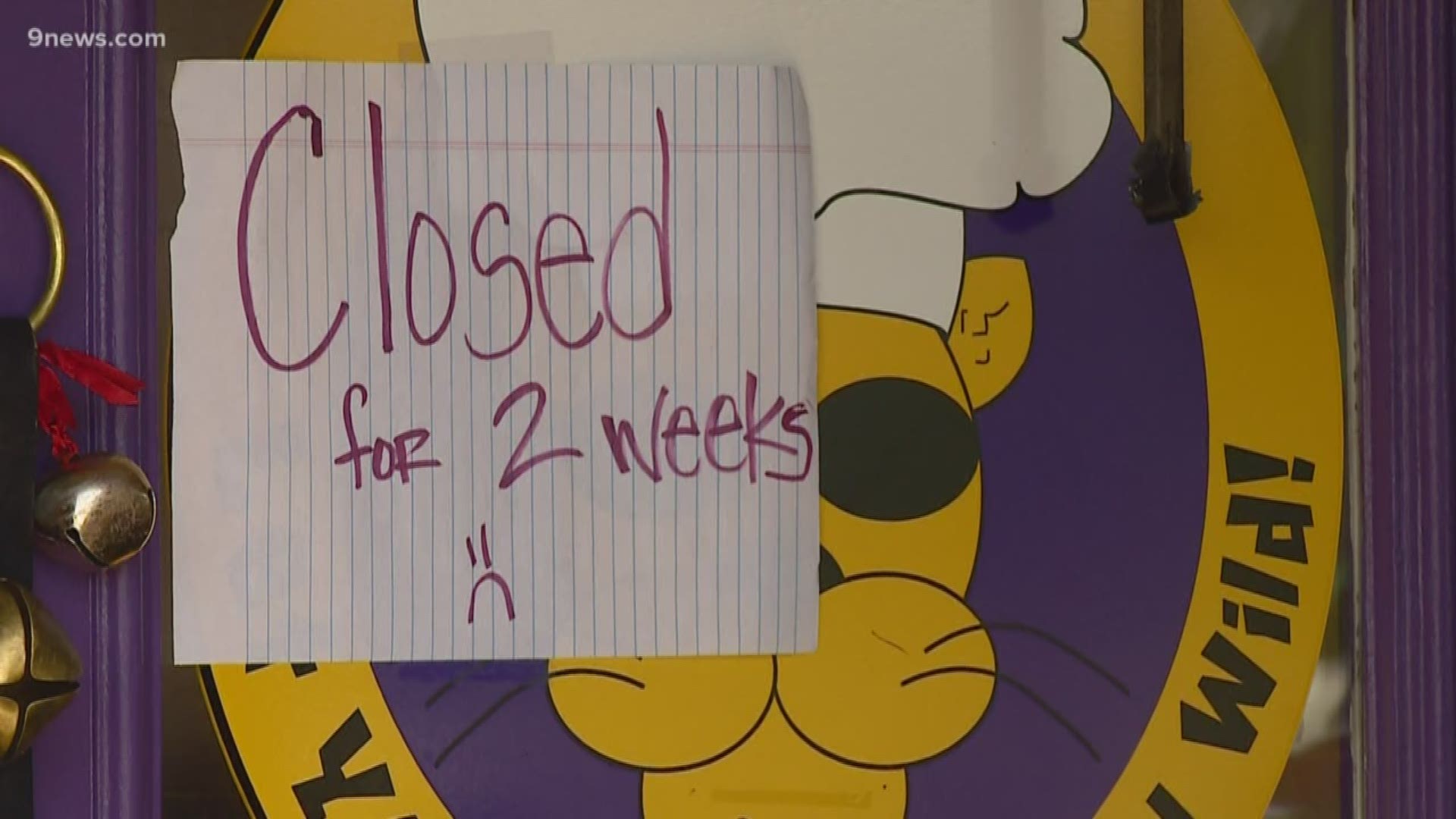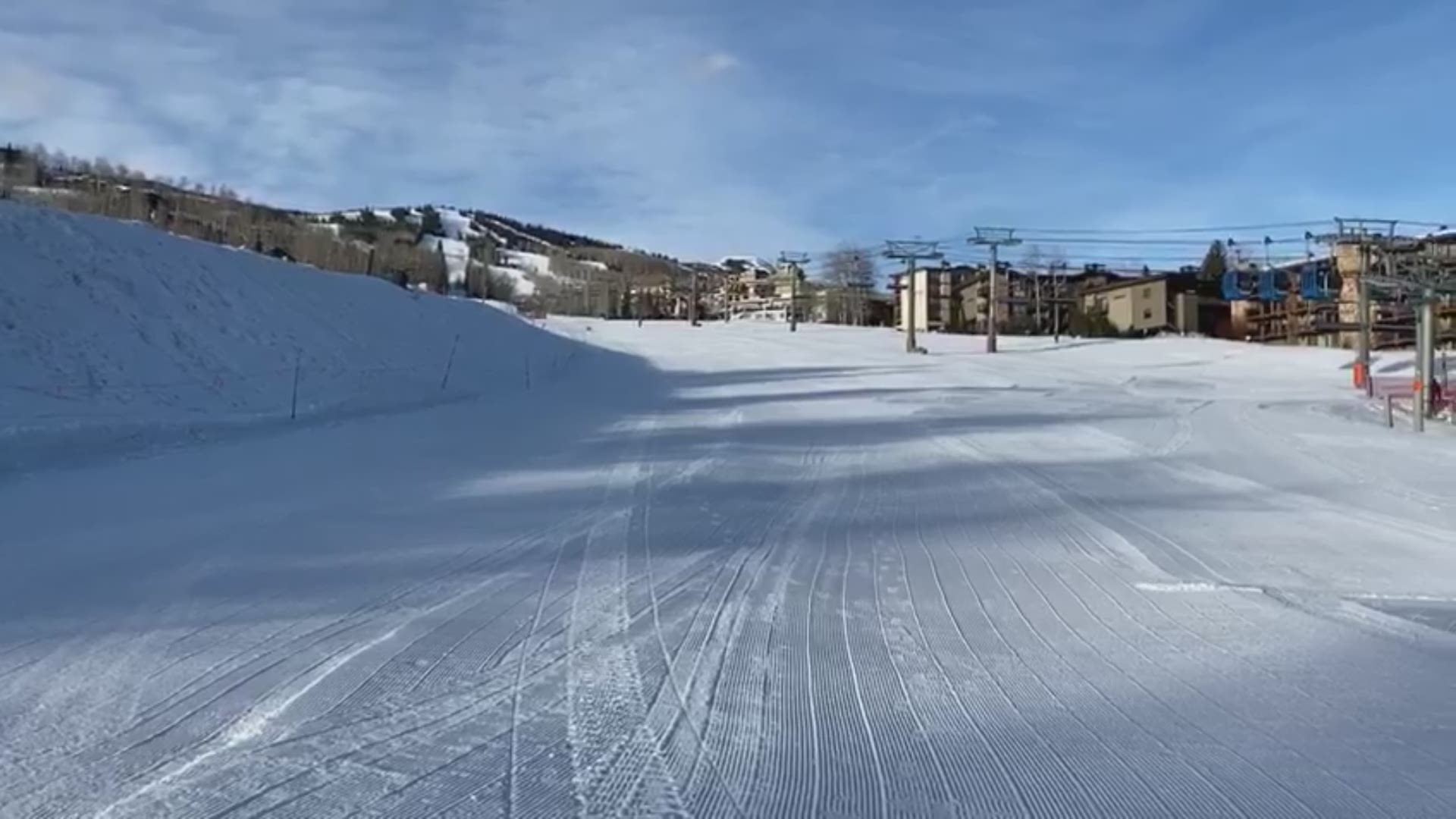COLORADO, USA — All Summit County lodging businesses are required to close by noon Thursday as part of a public health order announced Monday that also includes closing dine-in areas and suspending bus and transit services.
That's according to a notice posted on the Summit County Government's website that outlines restrictions that are meant to mitigate the spread of the novel coronavirus, COVID-19 in the county.
The restrictions come a day after Colorado public health officials urged residents and visitors to Summit County and three additional mountain counties to minimize their contact with other people.
Cases of COVID-19, a new strain of coronavirus, began popping up in the United States in February. On March 5, the first case was announced in Colorado. At least one person has died in Colorado and more than 160 people have tested positive.
RELATED: Coronavirus live blog: March 16-22
The Summit County health order does the following:
- Requires all dine-in activity at restaurants, bars and cafeterias be suspended effective 10 p.m. Monday. Delivery and takeout options are permitted.
- Suspends Summit Stage public transit services as of 2 a.m. Tuesday morning.
- Suspends rideshare services like Uber and Lyft after 11:59 p.m. Monday.
- Suspends shuttle services after 12 p.m. Thursday.
- Requires all retail business locations that "see foot traffic" to close by 10 p.m. Monday until further notice, with the exception of banks, grocery stores, liquor stores, marijuana dispensaries, pharmacies and gas stations.
- Requires all lodging businesses — hotels, motels, timeshares and short term rentals — to close by 12 p.m. Thursday.
Due to the extensive spread of the illness, anyone who visited Eagle, Summit, Pitkin or Gunnison counties in the past week should minimize all contact with other people, even if they are not experiencing any symptoms, the Colorado Department of Public Health and Environment (CDPHE) announced Sunday.
As of Monday morning, there were at least 24 positive COVID-19 cases from people who had spent time in Eagle County, 13 in Pitkin County, eight in Gunnison County, and three in Summit County. (These numbers include both Colorado residents and out-of-state visitors who tested positive.)
If you are in those communities or elsewhere and are experiencing symptoms (cough, fever and shortness of breath), you must be isolated for at least 7 to 10 days after the onset of symptoms, according to CDPHE.
It is only safe to leave isolation if your symptoms are improving and you don't have a fever for 72 hours immediately prior to the end of your isolation.
Isolation could be longer for people who have more severe illness or who work in high-risk occupations like health care.
Community transmission is likely increasing across the state, according to health officials, who said the measures are important to implement everywhere but are urgent for residents and visitors of mountain communities where they are already experiencing high rates of community transmission.
CDPHE recommends that residents and visitors of the affected communities take the following actions:
- Stay home or in a comparable setting as much as possible.
- Work from home if possible. If you can’t work from home, maintain at least 6 feet of distance between you and your co-workers or customers.
- Only go to public spaces for necessities such as groceries and the pharmacy.
- Continue healthy, non-group activities like walking, hiking, jogging, cycling and other activities that maintain distance from other people.
- Don’t gather in group settings.
- Avoid mass gatherings.
- Maintain distance (approximately 6 feet or 2 meters) from others.
- If you need to travel, use a private vehicle instead of taking buses, ride shares, flights or other transportation that puts you in contact with other people.
- Continue to operate critical business functions, such as the delivery of goods and operation of businesses, with social distancing and additional safety measures in place.
“We’re seeing extensive outbreaks in these communities,” said Dr. Rachel Herlihy, state epidemiologist for CDPHE. “We are asking people to take this voluntary action to slow the spread of the disease in Colorado and keep people safe. If we do this now, our hope is that we can slow down the spread of this virus and lessen the potential stress on our health care systems and workers.”
Certain people are at higher risk of getting very sick from COVID-19, including:
- Older people (over age 60), especially those over 80 years old.
- People who have chronic medical conditions like heart, lung or kidney disease, or diabetes.
- Older people with chronic medical conditions are at greatest risk.
Everyone should continue to take the following actions to protect themselves and those close to them:
- Practice social distancing: When possible, increase the distance between people to 6 feet to help reduce spread.
- Don’t shake hands. Instead, bump fists or elbows.
- Do not attend public gatherings.
- Frequently and thoroughly wash your hands with soap and water for at least 20 seconds. If soap and water are not available, use hand sanitizer with at least 60% alcohol.
- Cover coughs and sneezes with a tissue, then throw the tissue in the trash, or use your inner elbow or sleeve.
- Avoid touching your eyes, nose and mouth with unwashed hands.
- Stay home if you’re sick, and keep your children home if they are sick.
- Clean surfaces in your home, and personal items such as cell phones, using regular household products.
SUGGESTED VIDEOS: COVID-19 Coronavirus


